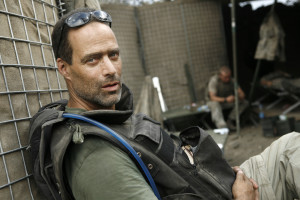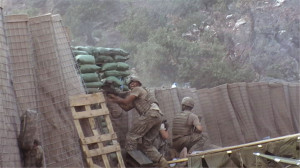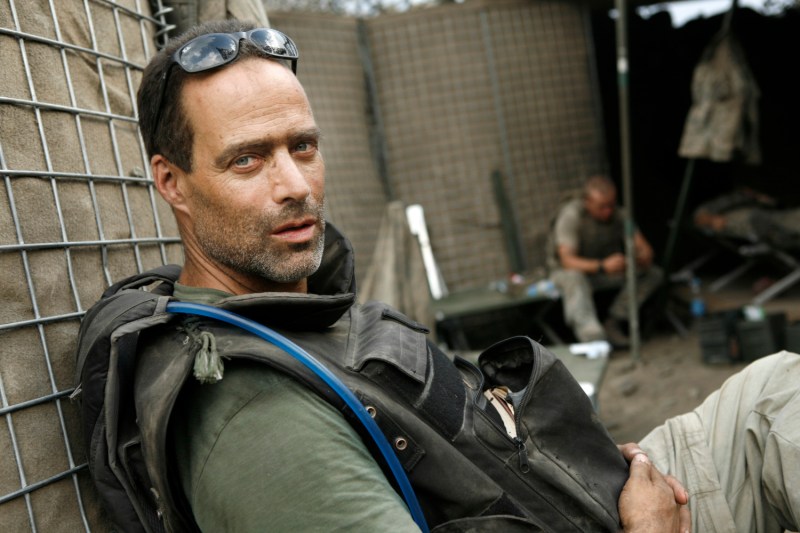
Between May 2007 and July 2008, acclaimed journalists Sebastian Junger and Tim Hetherington lived with Battle Company platoon in Afghanistan’s Korengal Valley, widely considered one of the most dangerous places on Earth.
Their courage bore fruit — “Restrepo,”a visceral and haunting portrayal of the hazards of counterinsurgency, changed the way Americans envisioned the war in Afghanistan. Tragically, shortly after the film was nominated for an Academy Award, Hetherington was killed during Libya’s civil war.
Today, Junger’s new documentary “Korengal” revisits the valley, delving deeper into the emotional reality of modern war.
If you saw “Restrepo,” then you will recognize the outpost in “Korengal,” which was named after soldier-medic Private First Class Juan Restrepo, who fought and died in the area. When Junger askssoldiers about Restrepo, many of them begin to cry — but others start dancing to a Spanish rendition of “I Will Survive,” the music Restrepo selected for his funeral. This is the difference between the two films: where “Restrepo” foregrounds the drama of battle, the tragedy of loss, “Korengal” exposes how, exactly, American soldiers survive psychically when pushed to physical extremes.
“Korengal” is bold about exposing the emotional and moral ambiguity of war, and how war provides soldiers a sense of community, purpose and adrenaline. Junger shows soldiers playing jukebox music during firefights, high off their apparent ability to “cheat death.” Service members are patently distrusting of the local population and suspicious of the counterinsurgency doctrine to win the “hearts and minds” of the civilian populace. Throughout the movie, soldiers voice nostalgia for war, claiming they want to “go back” to the so-called “Valley of Death.” As Specialist Kyle Steiner admits, “Fighting another human being is not as hard as you’d think when they’re trying to kill you.”
“Korengal” does not follow soldiers from their deployment to their reassimilation in civilian life. Instead, the film implicitly addresses the gap between long-distance expectations of war and its lived reality. The Korangal Valley setting seems to embody the tension between romance and realism: even as soldiers plot their next engagement, they overlook a strikingly beautiful landscape, where villages are hemmed into cliffs and the snowy peaks syncopate the skyline. From a distance, the Koran Valley mountains are seductive and, at times, reminiscent of a ski resort: “This place could be sports heaven,” one sergeant jokes, “if they’d just stop shooting at us.”

Here, Junger reveals the Taliban’s home-turf advantage as a central challenge of counterinsurgency. The mountains afford the Taliban “an almost ghost-like ability to move.” As Captain Dan Kearney puts it, “We’re playing in their backyard.” While Junger does not incorporate much footage of the insurgents themselves, United States soldiers describe them as motivated, well-trained and equipped with Soviet weapons. The documentary helps explain the elusiveness of “victory” in Afghanistan — and the human costs of the protracted stalemate.
Although other narrative features — like “The Hurt Locker” and “Black Hawk Down” — also deal with the oscillation between crisis and ennui that seems to characterize modern battlefront and brotherhood, respectively, Junger’s documentaryis unique for its explicit effort to dispel romantic notions of war. When asked about what bravery means in wartime, many service members dismiss the notion that their job is inherently heroic. Instead, they argue that “the brave thing is guys doing their job because they know that the guy next to them needs them to do their job so that they can all go home.”
For the soldiers of Battle Company, bravery is an everyday habit, rather than a medal to flash in their hometowns. “Korengal”itself is an act of valor: Sebastian Junger risked his life — and Tim Hetherington gave his — to collapse the distance between home front and warfront. This is not a movie that climaxes clearly or comes to complete closure. Through its vérité style and loose structure, “Korengal” asks us to be brave too: we must confront the reality that war does not conform to easy narrative.
Mostly, Junger reminds Americans of the indelible fact that violence in the Korengal Valley has direct bearing on our own lives. The burden of unraveling the perverse logic of the War on Terror and contending with its tragic consequences should not fall on the men and women who have already given most to the war effort.
“Korengal” opens at Opera Plaza Cinemas in San Francisco today, and will screen for just one week.
